Fugazi - Interview with Guy Picciotto Part 1
by Benjamin Howarth
published: 22 / 1 / 2002
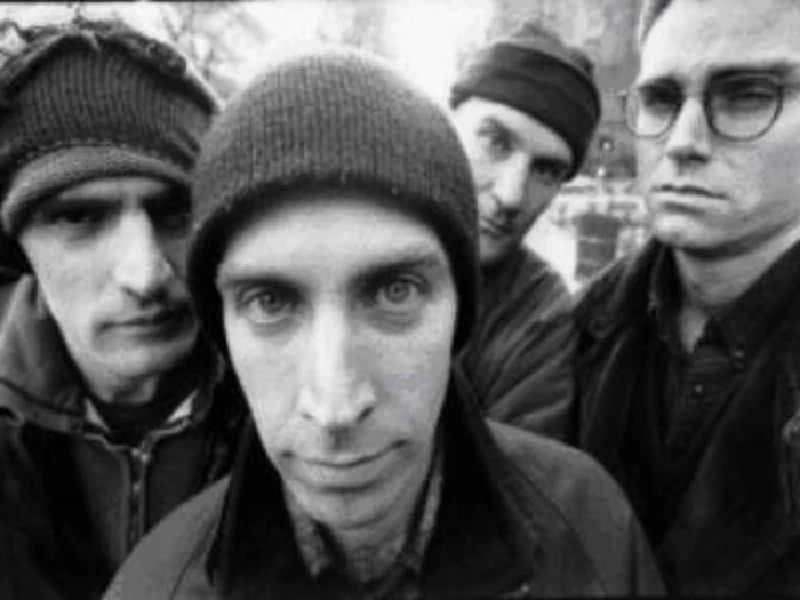
intro
One of the best known punk bands of all, Fugazi have recently returned to the fray with a new album 'The Argument'. In the first part of a two part interview, Ben Howarth speaks to guitarist/vocalist Guy Picciotto about its recording.
If you have even a slight interest in alternative rock music then I’m sure that you’ll be familiar with Fugazi. It is well documented that they have set themselves apart from much of the music industry. This stance is definitely of interest to rock fans. Fugazi’s records are all cheaply priced and released on singer/guitarist Ian Mackaye’s Dischord label. The band also tries to ensure that there is no violence at concerts and that, therefore, that everybody has a good time. In fact, the band are committed in every way to their fans. You can be sure, for example, that should you write them a letter then you will get a reply. The band have, like Mackaye’s old band Minor Threat, been linked to the straight edge movement. In fact, the band don’t really recognise straight edge as a movement nor as a genre of music, and wouldn’t describe themselves in that way, although they are all straight in that they don’t drink or take drugs. Unlike Ian Mackaye’s old band they don’t make this a major issue. Fugazi attract a lot of interest because many people see them as an inspiration and proof that you can operate a band entirely independently from the mainstream music industry. What makes Fugazi stand out in my mind most, however,is how brilliant they sound. Unlike many other groups, the bass and drums are at the forefront of their sound. Both leap out at the listener, and when their tight rhythms are combined together with the interplay of the two guitarists, the effect is captivating. Fugazi are one of those groups, like Shellac, Joy Division or The Smiths, that one imagines would sound brilliant whatever song they were singing. Their songs are memorable too though. Their lyrics are intelligent and articulate, sometimes covering political themes, sometimes deliberately more obscure, but always a challenge to the listener. One gets the impression, though, that the music is more important to them than the lyrics or the message behind them. The origins of Fugazi came from the late 70s/early 80s Washington DC hardcore scene. For anyone unfamiliar with it, the music was inspired by the British punk scene but tended to be harsher, heavier and less melodic. One of the key bands of the period was Minor Threat. Minor Threat featured Ian Mackaye on vocals and were one of the first groups to coin the phrase “straight edge”. The records came out on Ian’s label, Dischord, and that label also featured some of the best of the other bands on Washington DC scene. Among the bands was Rites Of Spring – featuring future Fugazi members Guy Picciotto and Brendan Canty. Both have also played together in a number of other groups. After Minor Threat’s split Ian briefly formed Embrace, who released just one album and then Fugazi appeared. The band progressed beyond the hardcore sound, although maintained elements of it, to incorporate a wider range of influences and a more developed, progressive style. Fugazi has now released six full albums, '13 Songs' a compilation of their first two mini-albums and two three-track singles. Aside from that a video/DVD has been released supported by a soundtrack album based on practice tapes and demos. The group's most recent two albums, an album and a single, came out together. 'The Argument' was one of 2001’s best albums and in my opinion Fugazi’s best, while the single 'Furniture' was also fantastic.It is clear that after all these years Fugazi are still releasing music that is exciting, varied and ambitious. They also seem to have been getting better with every new record. I spoke to singer/ guitarist Guy Picciotto. The line-up is completed by Ian Mackaye (guitar/vocals), Joe Lally (bass/vocals) and Brendan Canty (drums). A second drummer, Jerry Busher, has recently joined them for some live shows and also on the new record. PB : Are you satisfied with 'The Argument'? GP: Yeah. Generally when we put out records I tend not to listen to them for a long time because when you’ve just finished working on something you become so immersed in it. But with this record it was more satisfying. We went in not knowing if we were going to come out with a record. We just booked time in the studio and we knew we had some songs, but not everything we had was finished so we didn’t know if it was going to lead to a record. It went so smoothly that we ended up with enough material for an album and an EP so it went better than expected. PB: Do you think it was an improvement on your previous albums? GP: It’s hard to compare them. Its like comparing members of your family or something like thaT. With each record you have such an intense experience working on it. But with this record we managed to do a lot of things that we hadn’t managed to before. We brought in other people to play with us and we spent more time on it. In the past we have recorded really quickly. The early records we did in less than a week. With this we took more time, experimented a little more, we become more confident with each record we do. Like, the technology we use for example. We learn a little bit more with each one we do Becoming a better musician doesn’t necessarily mean that you will be a better band but I do feel that I am becoming,gradually, better on the guitar and we are beginning to push ourselves more and more. I do feel that about this latest record. PB: When you started off the recording did you already plan that you were going to bring in other people to work with you? GP: The only thing we knew we were going to do is use our former roadie, Jerry Busher – who had been playing with us live for a few years as a second drummer. That kind of came out because on our last record “End Hits” our drummer overdubbed a lot of drum parts and we ended up with the sound of two drum kits, and to recreate that live we asked Jerry because he is a great drummer and we felt confident playing with him. We ended up adding second drum parts to more and more songs or extra percussion. For this record a lot of songs were written with that in mind. We knew we were going to have that big drum part and interplay between Jerry and Brendan. The other things, the cellos and the backing vocals were just ideas that came to us when we were recording. Once we had Jerry in there it was kind of like “I have an idea for a certain extra part or vocal line – maybe we should get someone in to do it. It would be really fun!” PB: Did you ever think, “oh, this is going to be more tuneful and less of a hardcore record”? GP: People have been saying that. Songs have their own direction when you start working on them. It’s not anything purposeful to make a melodic or tuneful record, although that is what people have been getting out of it. I don’t think any of our records are particularly dissonant. When you play together for as long as us, fifteen years, there are certain comfortable things that you naturally do, your trademarks or whatever. We always try to break up our trademarks or push beyond them. We don’t like getting caught in some kind of a rut. I think that was one of the things we just tried to push ourselves on,trying to find a new direction or new sound. But, the biggest concern for us is to make music that we can get into. If you try to cater for what people are going to like then you end up fucking with your own mind because you don’t know who you are trying to please. If you can get it past the four of us then that makes me happy. We’re as hard as hell on each other and have a strong quality control where we make music that we think is good enough. Like you say, a lot of people are saying this is a more melodic record, and more user friendly, and that’s fine if people hear it that way then great. But it is never a question of trying to please everybody. PB: I was a bit surprised when I heard the single, because I got it a few weeks after the album, and found it to be more of a hardcore track. GP: That’s why we didn’t put those songs on the album. We recorded all the songs at the same time but the three songs that ended up on the single were older songs. We had too much material and didn’t want to make a double album. A double album with 13 songs is kind of ridiculous, you know. When we tried to sequence the album the only way we could get it to work is when we took those three songs off. Then the album really had a personality. So the single had two really old songs. 'Furniture' is one of the oldest songs we ever wrote, like 1986. 'Hello Morning', the music was written in 1988 but we never had a set of words to go with it. The instrumental is new but we felt it fitted in better with those. We’re like archivists. We have songs that we can keep working on for decades. The songs don’t get recorded chronologically. There is a song on the album, 'Epic Problem', and we have actually had the music for that in some form or another for six or seven years, and the name comes because there was a serious epic problem trying to work that song! So that’s the way it works. On every record there are songs that we pulled out of an idea that we might have been working on for years. PB: I’m going to move on to just general writing. Do you tend to write apart or together as a band? GP: At this point with the music everything is written completely together. None of us will come in with a complete song. Generally what will happen is one of us will come in with an idea, a piece. We liken it to a gangland initiation – we all beat up on the part for so long and if the piece survives it we use it! Everything gets written together and there is a lot of jamming and just showing each other things and each of us putting new ideas on it. We always have tons of music stacked up and then one of us will end up writing a vocal part to go with it. We’re more prolific musically than lyrically. It takes a lot longer to get vocals together. PB: So is it ever the case of writing a lyric and then writing a tune that fits? GP: That’s almost never happened. I don’t know why. There have been a couple of times – these freak moments where I actually will write a lyric and a piece of music all in one go but its really rare that that happens. PB: Do you spend a lot of time revising or reworking words or do you stick to what initially strikes you? GP: We revise like crazy. I think part of it is that we set up a little 8 –track reel to reel recorder in our practice room. We tend to record stuff as we write it then go back to it and rework parts. That’s why eventually we have to book time in the studio or we’d never finish reworking stuff. That’s one of the reasons we book the sessions for this record. We’d been tinkering for 3 years and we were like “enough is enough” and even then a lot of the songs on the record were only arranged right before we put them on tape. That’s kind of the way we work. PB: How do you select subject matter for songs? GP: Its up to the person that’s writing it. For me, songs I write come from an idea I get that I just work on. I find it such a struggle to write lyrics. I don’t have a journal of stuff sitting around. If I can get a bit of an idea a door opens for me and I can write the song. It takes a lot of sweat for me. PB: Do you always have the person who writes the lyrics singing them? GP: Pretty much always. Occasionally we’ll write back up vocal parts for other people but if you sing the main vocal that’s your lyric. PB: Did any specific guitar players influence your playing style? GP: I’ve got guitar players that I love. I mean, I’ve always been really into Tom Verlaine from Television. They reunited in the mid 1980s and I went to see them play live and it was really, really amazing. I’ve always been into the guitarists from Sonic Youth and I’m a big Beatles fan and I love a lot of sixties stuff. But in terms of my own playing I’m limited technically and I can’t really be influenced because I can’t figure out what they actually do. I’m more influenced by playing with other people. When I was in Rites Of Spring as a teenager I learned a lot from playing with Eddie Janney the guitar player in that band, and also from Brendan our drummer who is a great guitar player as well. I’ve written a lot of stuff with him and he has influenced the way I play a lot. That’s basically it. PB: When you wrote music with Fugazi, especially in the early days, did you try not to make music that sounded like your previous bands, Minor Threat or whoever? GP: No, not really. We don’t worry about copying or whatever. We just have our own way of playing. When I was really young, 15 years old, my first band Insurrection were a cross between Motorhead and Discharge, who I still like, but it was derivative. I learned a lot because we played shows and it was exciting. But something was missing because it felt second hand. So, the next time I put together a group, Rites Of Spring, a couple of years later aged 17 the chemistry between us made ourselves feel unique, and once you’ve felt that you don’t want to go back to just copying. PB: With Fugazi especially I can’t think of any bands that sound like you. Did the unique sound take a lot of effort to evolve? GP: Well, it just came together. Brendan and myself had been in 5 bands before together, and Ian had been in a bunch of bands as had Joe. Everyone had strong creative personalities and when you put the four of us together it was just a question of chemistry. A lot of times people say “oh, this band is a Fugazi knock off” but I listen to them and I can’t hear it. Sometimes I can’t even work out what our sound is. Any time I come up with an idea, by the time it goes through the filter of the whole band it gets completely changed. Its not just one person's vision so its ends up a weird hybrid, and unique. PB: Yeah, two in particular have been labelled the “new Fugazi”, Hot Water Music and At the Drive-In, and I just can’t hear it. GP: I mean, I don’t have any opinions on those bands other than when I hear them I don’t think it sounds like us. It’s hard for me to judge because I don’t think it’s easy for me to be objective about what we sound like anyway. I always think its cool that people think of us as something to refer to but I just wish that I understood it. A lot of people talk about this genre of music, emo music, and I just can’t hear the common link between it. PB: Has playing live changed at all over the years? GP: The biggest change recently has been adding the second drummer. When the band started though I didn’t play guitar, I only played guitar when we did 'Repeater', and the move to that from being vocalist/backing vocalist was big. But the second drummer has changed it a lot. It’s only on half the songs but it increases the size of our sound. There is now guitar interplay and drum interplay and the whole thing is a madhouse! Other than that it is the same. We still don’t use a setlist and we still don’t plan anything until we hit the stage. That keeps it fresh for us. But people do need to see us play live I think. The records offer a perspective on us but when we play live that really fleshes it out for a lot of people. It’s cool to have this 'Instrument' movie out because it gives people more of an opportunity to see us play live. PB: Do you tend to pick recent stuff or a wider range of your material? GP: We do focus on newer stuff because people haven’t heard it and we want to play it. But we cover the whole range every night. The more records we make the harder it gets. Before the tour we practice about a hundred songs because you never know which one will get called out. It’s really hectic. PB: Do you still have problems with people moshing and stagediving at gigs? GP: It’s been a war of attrition for ages. It’s never really been a question of being anti-moshing or anti-slamdancing, it’s just whether or not people are getting hurt in the room. We play shows where it’s really obvious. We play some really small gigs when we are on tour around the world, and there is a lot of energy in the room, but the show is small and you know everyone in the crowd knows each other and its not a problem. We just let the kids go off. It’s not a problem. We never attempt to police that kind of thing. The problem is bigger shows where there are all kinds of conflicts going on in the crowd. People who just want to groove to the music and then there are people who are being edgy or violent. That’s the kind of thing that we want to stop. But in the last couple of years it has been really great. People know what to expect from us and it seems to be people who are interested in listening to the music. When we started out we got a real mixed bag in the crowd, people who were fans of Minor Threat or the other bands and didn’t really know what this band was about. But I think after fifteen years people know us well. PB: You have probably been askedthis question a lot, but when the band started out did you feel any pressure because Ian had been in such a revered group as Minor Threat that he would be seen as more important than the rest of you? GP: Well, there was no internal pressure. The important thing was for us to play and become a band, without any preconceptions placed on us. That is one of the reasons we toured without a record out for over a year. We went to Europe and played in the States, just so that the band could become a group without having extra baggage put on it. It really helped because we avoided a lot of hype based on our old bands and we could become real. Once the record came out and we started playing it shifted people’s impressions. I think Ian will always be the guy in the band who people immediately refer to just because of his position with Dischord and his position managing the group, but the group is a democracy not just within songwriting and music, but also the business side so within the group we don’t have any hang-ups about it. PB: Do you have any major goals for the group that you have yet to achieve? GP: For me it’s always about making better records. I’m really confident about our ability as a live band. For me playing live is what I enjoy the most, and we aren’t able to tour as much as we used to because two of the guys in the band have families now, which is a bit of a hang-up, but when we do go out and play I feel comfortable with it. In terms of making records it has taken us a while to adjust to work in the studio. The thing I have always felt most ambitious about is learning to make better records, and we do feel comfortable. Doing the 'Instrument' soundtrack really helped because that was based on a lot of practice. It wasn’t self-conscious and we put a lot of spontaneity into it. Listening to that helped us to not be so stiff when we recorded. PB: Do you find recording difficult to do? GP: Yes, definitely. PB: Is that the pressure that it’s going to be released? GP: Not that really. Its just a static atmosphere, you are in a laboratory trying to make things and there is no crowd. It helped bringing people in because it created a slightly different energy. We have worked in the same studio with the same engineer for so long now. We just shook things up a little bit. PB: In the past you have worked with Steve Albini. Would you go off now and make an album with a "name" producer? GP: I don’t know if we would. I can’t say we never would but we like to be in the driving seat running the machines. Everyone in the band has produced other bands in the past so we know what we’re doing. Our experience with Albini though was incredible, I must say. We ended up not releasing the tape because of problems we had with the quality of our own vocals. Our own performances weren’t perfect, but just being around him and watching him engineer and to hang out and become friends with him, it was awesome. It helped us a lot, because we were at a point where we were still trying to figure out how to do things. The guy is a fucking genius when it comes to mike placement and a genius for his whole approach. We come out of the same era and we share the same ideas on the way things should be done. PB: What do you think of the current music scene? Do you think it is an improvement on the music of the past? GP: The impact of music when you are 14 or 15 is always going to have a special feeling for you because it’s so fresh. It’s hard for anything else to really live up to that. Having said that, I do think there is some amazing music coming out now. Interesting stuff is happening again now. There is a split between underground music and the mass culture again. There was confusion in the early nineties where it seemed to be joining together and that disrupted the underground music scene. Now there is just an amazing amount of labels and an amazing about of bands. I find it really interesting. I always think that there needs to be a constant adventure to it. Occasionally it slacks off from that, but right now people are really pushing it. There is a guitar player in a band called Orthrelm on Joe’s (bassist in Fugazi) Tolotta records and he is definitely one of them. His playing is so savage and when you see that you realise that people are still being adventurous. He is outrageous! PB: Do you feel a sense of pride at the amount of influence you can have on your fans? For example, the amount of people that have extended Fugazi websites to become political websites, even though you are not really an out and out "political" band. GP: I think it’s really cool that we can have that effect on people. I think at this point of time there is a lot of work that needs to be done in terms of progressive and radical politics. Political activism is the groundwork that needs to be done and the more people out there doing it the better. If the band is inspiring then, yeah, that’s awesome. We didn’t make it a self-conscious desire to be political. We just wanted to play but in addition to that we felt that there we things we could do politically within the band as an outcrop of the band. We didn’t form the group in order to fulfil any political agenda. That wasn’t ever the case. We just wanted to make records and play concerts but whilst doing that if we can play rallies and benefits then to us that is just an added bonus. It’s not the reason for our existence, that’s to make music. PB: Do you think that the band will still be around in 5 or 10 years? GP: I honestly don’t know. I’m glad that we’ve lasted this long, fifteen years. I didn’t expect it to at the beginning. So long as we keep making good music we’ll keep playing I guess. Maybe a contradiction will appear that we can’t resolve but the one thing I think that will break the band up is if we stop being interesting. At the moment I still love it. I mean, we’ve been taking a break for a few months whilst Joe has had his first child born and I just can’t wait to get him back so we can rehearse and go out on tour again. PB : Thank you
Picture Gallery:-
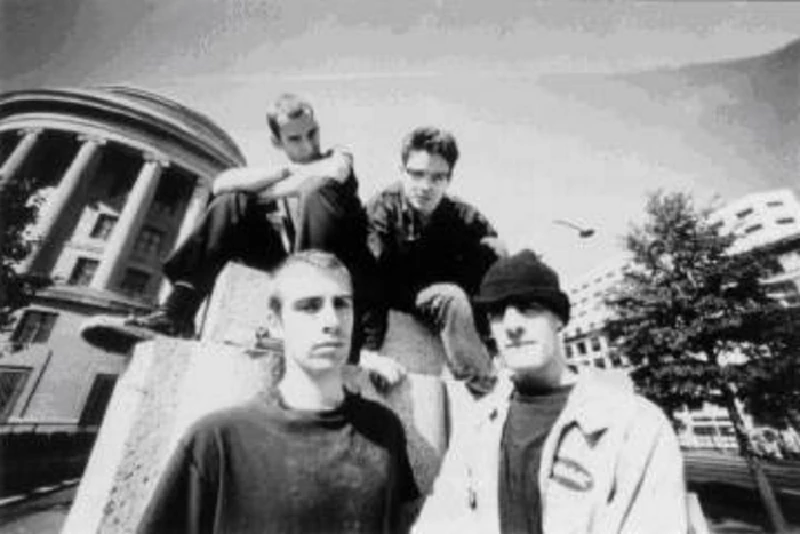
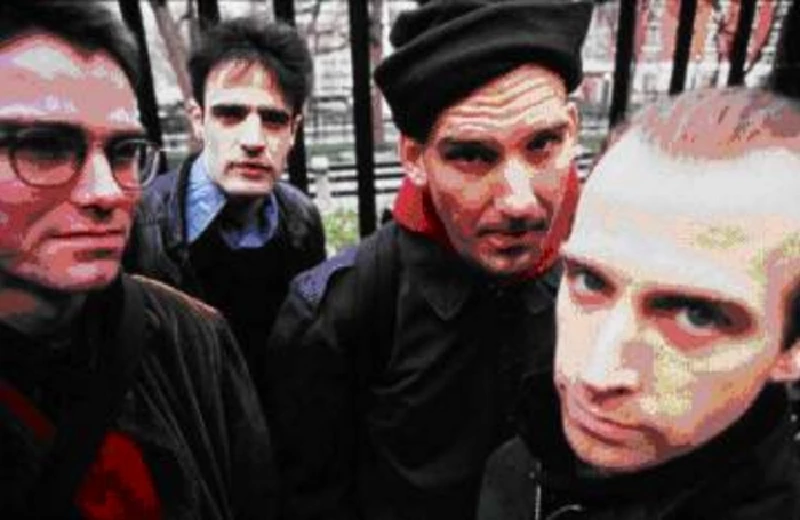
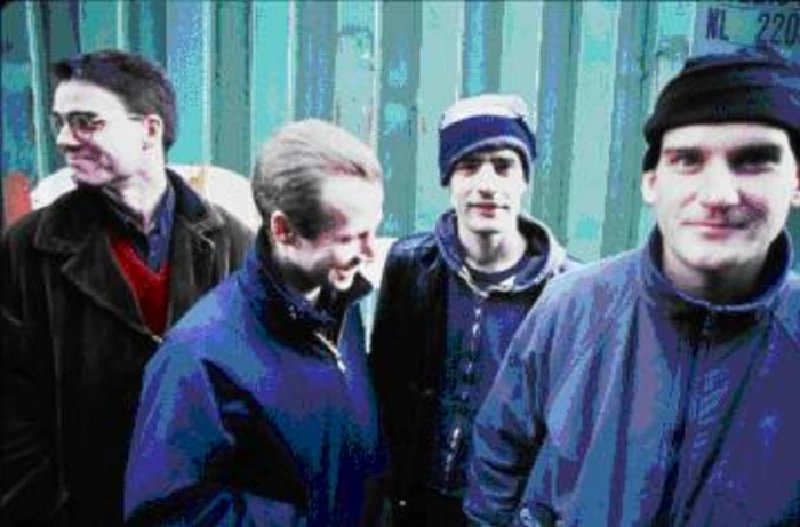
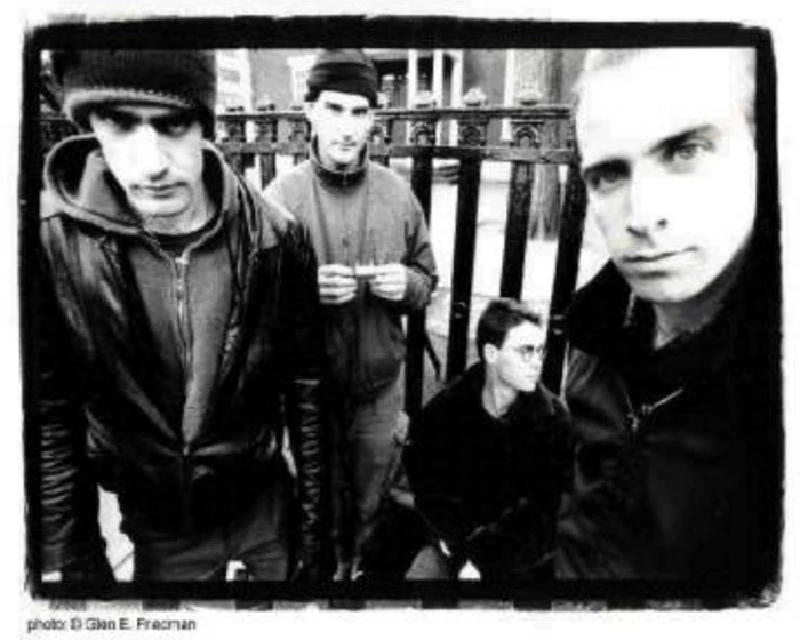
interviews |
|
Interview with Guy Picciotto Part 2 (2002) |
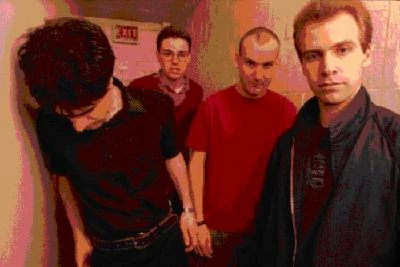
|
| In the second and final part of our Fugazi interview, Ben Howarth talks to guitarist Guy Picciotto about songwriting, playing live and the band's political conscious |
live reviews |
|
Exeter University Lemon Grove, 21/10/2002 |
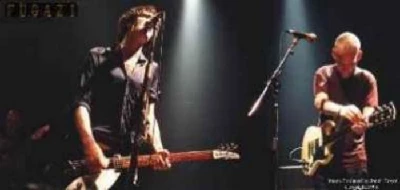
|
| Fugazi played one of the smaller dates of their recent British tour at Exeter University. Ben Howarth finds the band to be '"perfect at making their music serious, and a gig something of an event without being ridiculous about it." |
reviews |
|
Argument (2001) |
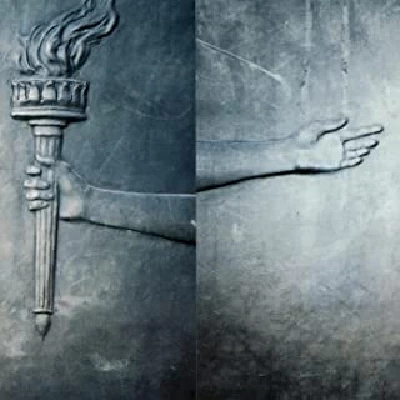
|
| Although you won’t find as much hype for it in the music press as some underground bands manage to achieve, one of the most heavily anticipated records from the American underground music scene is al |
most viewed articles
current edition
Carl Ewens - David Bowie 1964 to 1982 On Track: Every Album, Every SongArmory Show - Interview with Richard Jobson
Colin Blunstone - Thalia Hall, Chicago, 16/7/2025
Visor Fest - Valencia, Spain, 26/9/2025...27/9/2025
Bathers - Photoscapes 1
John McKay - Interview
Loft - Interview
Robert Forster - Interview
Billie Eilish - O2 Arena, London, 10/7/2025
Sir Tim Rice - Interview
previous editions
Heavenly - P.U.N.K. Girl EPManic Street Preachers - (Gig of a Lifetime) Millennium Stadium, Cardiff, December 1999
Beautiful South - Ten Songs That Made Me Love...
Oasis - Oasis, Earl's Court, London, 1995
Pixies - Ten Songs That Made Me Love...
Boomtown Rats - Ten Songs That Made Me Love....
Trudie Myerscough-Harris - Interview
Peter Perrett - In Dreams Begin Responsibilities Interview Part One
Prolapse - Interview
Coldplay - Wembley Arena. London, 16/8/2022
most viewed reviews
current edition
Amy Macdonald - Is This What You've Been Waiting For?Sick Man of Europe - The Sick Man of Europe
Phew, Erika Kobayashi,, Dieter Moebius - Radium Girls
Lucy Spraggan - Other Sides of the Moon
Davey Woodward - Mumbo in the Jumbo
Alice Cooper - The Revenge of Alice Cooper
Bush - I Beat Loneliness
Suzanne Vega - Flying With Angels
Blueboy - 2
Cynthia Erivo - I Forgive You
Pennyblackmusic Regular Contributors
Adrian Janes
Amanda J. Window
Andrew Twambley
Anthony Dhanendran
Benjamin Howarth
Cila Warncke
Daniel Cressey
Darren Aston
Dastardly
Dave Goodwin
Denzil Watson
Dominic B. Simpson
Eoghan Lyng
Fiona Hutchings
Harry Sherriff
Helen Tipping
Jamie Rowland
John Clarkson
Julie Cruickshank
Kimberly Bright
Lisa Torem
Maarten Schiethart